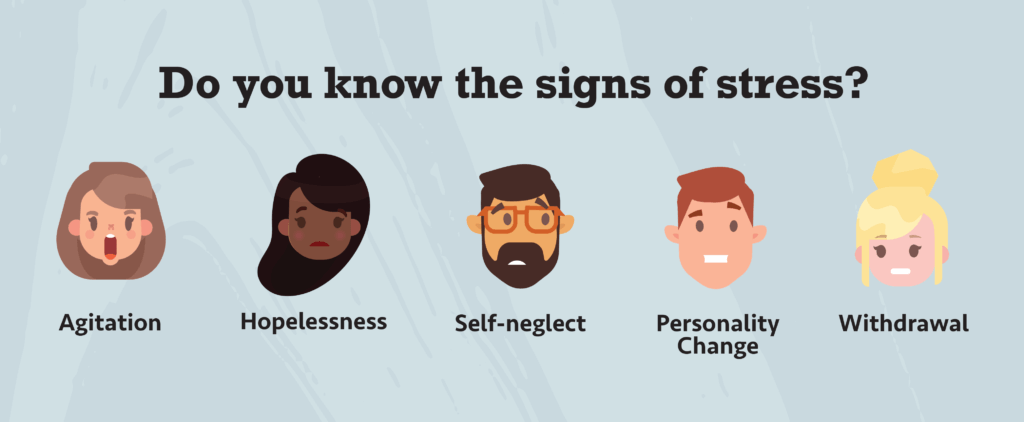January 16, 2020
Stress, chronic stress, too little stress, all of which have the ability to cause harmful effects but many are unaware of the true potential.
What if I told you there was a man, in his mid 20s, who exercised regularly, ate nutritiously, but the physician still prescribed medication to regulate his blood pressure? What if I told you that developing hypertension (high blood pressure) is one of the first steps in developing a chronic condition? I bet you can guess stress plays a role in the development of hypertension.
Just a short time ago I was prescribed medication to regulate my blood pressure. Why? Simply put, I was unable to handle the stress I encountered day to day. I was going down the road that many go. Fortunately for myself, I am young, however as we age stress plays a larger, more crucial role.
Stress is one of those things that simply gets brushed under the rug, why? Because everyone is stressed, in one form or another. Before you say, “I’m not stressed” understand this, you should be. Too little stress is just as harmful as chronic stress.
We live in a society where everything is go, go, go and we must continue to check one box after the next. A deadline is missed, and we beat ourselves up for weeks, one sales pitch gone bad and the search for new opportunities begins, one fight with our spouse and we question our marriage. Too often, the simple stressors weigh on us, and continue to bury us, day in and day out.
Unless…
We understand stress in greater detail!
What is Stress?
First things first, we must understand H-O-M-E-O-S-T-A-S-I-S. Dictionary.com defines homeostasis as the “tendency of a system, especially the physiological system of higher animals, to maintain internal stability, owing to the coordinated response of its parts to any situation or stimulus that would tend to disturb its normal condition or function.”
Excuse me, what?
The system of higher animals, referring to all of the systems involved in the human body, and their response to a situation. That situation may be good or bad, and the ability to remain at optimal functioning levels would define homeostasis. Got it? Keep that in mind, because we are going to dive into how chronic stress can cause harmful effects.
When our body is pushed beyond its limits, when it continues to fight, march on, and push forward, counter responses begin. When we do not allow for rest or recovery from those stressors it is only a matter of time before something goes haywire. The way our body defends against stress is just like anything else. Stretch a rubber band too far repeatedly and it is going to snap. A steady quarrel with our stressors not only has the power to do away with our homeostatic state, but potentially cause further harm.
Chronic Stress and the Effects within the Brain
There are mechanisms within our brain, axons and dendrites. Think of these as the cables that are connected with neurons (also in the brain). The dendrites bring information into the cell and the axons take information away from the cell.
What does stress do to those cables?
Just a few weeks of stress filled days, battles, and encounters are enough to cause those cables to atrophy, and shrink to the point where they become less efficient. As you can imagine that is going to have some lasting effect. The neurons, and the cells collectively, cannot communicate as well as they did when they had strong, open cables ready for information transportation. This is a direct correlation to the brain’s executive function, essentially the process in which you take in all that is around you, create judgements, and make advised decisions in order to meet intended goals. Fortunately, at the end of a stressful period our body is a remarkable with the healing process, and can reestablish connections and allow for information processing to become strong once again.
But what if the stress continues? What about chronic stress?
Scientists have been curious and ultimately warned the harms of chronic stress. Scientists now believe that chronic stress leads to the destruction of some of the brain regions often associated with dementia such as the hippocampus. The research supporting this phenomena must be considered as warning towards a decline in mental, and overall health. The common signs and symptoms of a chronically stressed individual include irritability, fatigue, headaches, difficulty concentrating, sleep disturbances, changes in appetite, low self-esteem, etc.

What can we do if we feel we are experiencing the common symptoms? Or know for certain we are dealing with chronic stress?
Always remember…
There are many simple outlets to stress such as sleep, exercise, nutritious eating, laughing more, meditating, practicing positive thinking, the list could go on and on. However, one of the most important ideas to remember is your stress reducer should not stress you out. Seems simple right? Too often individuals listen to a friend or a colleague regarding finding ways to deal with that stress. They may give ways in which they dealt with their own stress in the past. However, those may not be best for YOU.
Find something, anything, that works for YOU. Eliminate chronic stress and the harmful effects it may your health and happiness.
Take it from a man, in his mid-20s, who was not only prescribed medication, but underwent many tests, including a brain scan, extended period heart rate monitoring, and blood sampling all from a simple, everyday occurrence, stress.